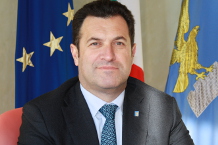European Committee of the Regions sets out ways to translate sustainable-development agenda into local and regional policies.
Visions of a sustainable future set out by the United Nations and the European Union will require a dynamic and sustained collective process that cannot by driven solely by “centrally managed, top-down policies and programmes”, the European Committee of the Regions declared on 12 July in a set of recommendations that also argue that the EU has yet to realise in full the “local and regional dimension” of sustainable development.
The Committee’s opinion, which includes 11 specific recommendations targeted at local and regional governments, suggests approaches that could translate broad framework policies adopted at the UN and in the EU into effective and durable change in social, economic and environmental policies in the EU’s regions and cities. It urges the full integration of local and regional government, identifying this as “the ideal approach for policies that aim to build a sustainable future and combine the 10 [European] Commission priorities with the 11 thematic goals of the Cohesion Funds and the 17 sustainable-development goals (SDGs) in the United Nations 2030 Agenda”.
The report, entitled “Next steps for a sustainable European future – European action for sustainability”, was drafted by Franco Iacop (IT/PES), president of the regional council of Friuli Venezia Giulia. Mr Iacop said: “We cannot simply take a top-down approach to this agenda. We need to give local and regional authorities responsibility and autonomy, so that they can provide the right answers to the big development and social issues of our time. It is only by giving local authorities responsibility and autonomy that the global sustainability agenda will have a lasting impact on people’s lives. The challenge requires a collective effort, and cities and regions have to be recognised as policymakers in their own right, not just executors of national policies. These goals put local and regional administrations at the heart of global action.”
Mr Iacop added that the focus on sustainability should also translate into greater attention to “cohesion” within the EU and into deeper collaboration with countries neighbouring the EU. Mr Iacop himself is supporting international sustainable development through, for example, his involvement in the CoR’s efforts to support Libyan cities. In June, he invited a Libyan delegation to study his region’s fisheries industry, with the aim of helping the development of Libya’s small, family-based fishing sector and the creation of jobs for young people.
The CoR’s recommendations are long-term, extending to the 2030 date set by the UN for each country to meet its goals. However, the opinion also directly addresses decisions that the EU will need to take in the near and medium term, arguing that the mid-term revision of the EU’s budget for 2014-20 must be geared to the SDGs “from the outset”.
While the opinion focuses on implementation of the “very ambitious” sustainable-development agenda within Europe, it repeatedly emphasises links to global action. It includes, for example, a proposal that regions and cities should be represented in “the governing bodies of international development organisations”.
The CoR adopted its recommendations on international development cooperation – the new European Consensus on Development – in February. The Consensus, which was signed by the European Parliament, the European Commission and the Council of the European Union on 7 June, endorses the creation of a multi-stakeholder platform on the implementation of the Sustainable Development Goals. The CoR will be a member of the platform, as requested by the CoR and supported by the European Parliament in a report authored by MEP Seb Dance (UK/S&D).








